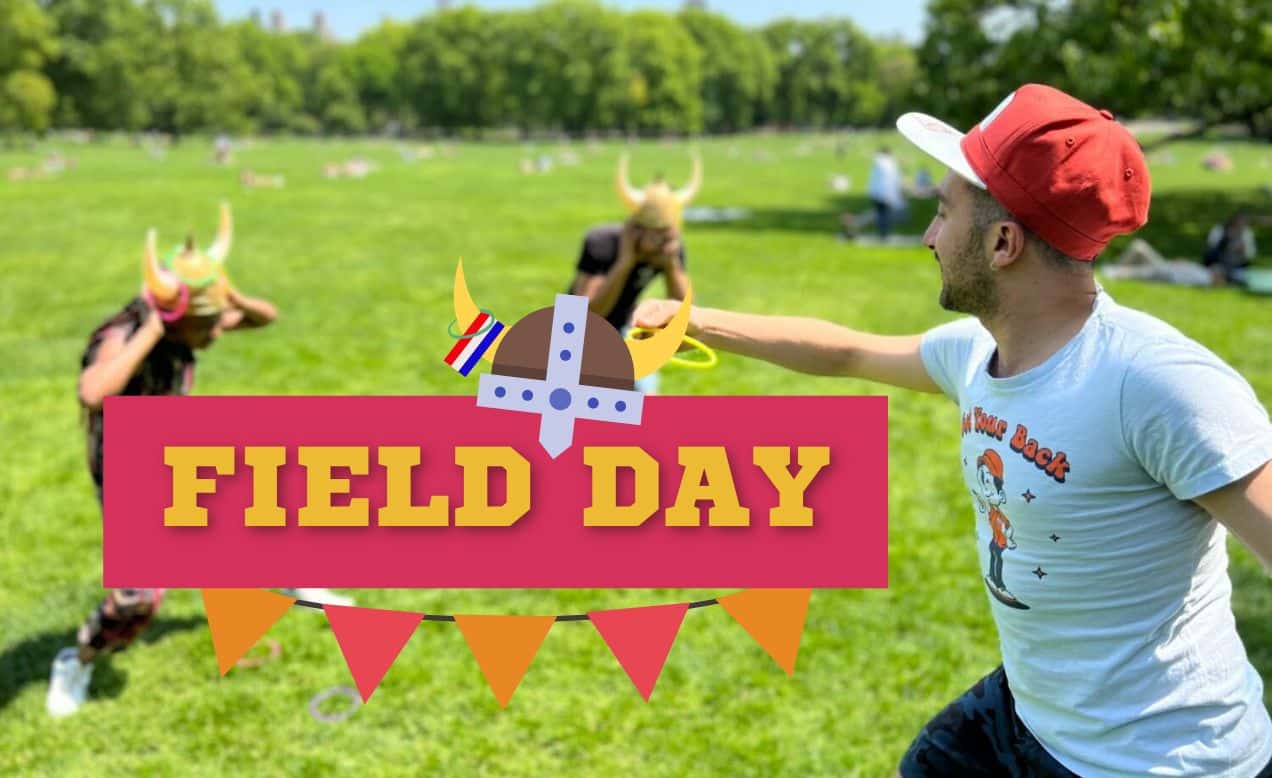You found our list of team building activities for college students.
Team building activities for college students are games, events, and exercises that involve working together to achieve a goal. Examples include sip and savor, idea building blocks, and find the mistake. These team building activities aim to build trust, collaboration, and better relationships among college students.
These activities are similar to interactive games for students, study games, online classroom games, and theater games.

This article includes:
- fun group activities for college students
- team building games for college students
- virtual team building activities for college students
- team building events for college students
Let’s get started!
List of team building activities for college students
These activities aim to create a positive and collaborative learning environment where students look out for each other. The following are various activities university students can do to encourage team building.
1. Field Day (Popular)

During Field Day, college students compete head-to-head in a series of interactive outdoor games! This experience encourages collaboration, friendly competition, and camaraderie among participants.
Key aspects of Field Day include:
- a 90-minute session led by an exceptional host
- an exciting variety of outdoor activities
- a blend of nostalgic games and innovative contests
- chances to capture candid team photos for the campus or social media
Further, we will come to your campus with all the necessary game equipment. To encourage laughter and bonding within your classroom, make sure to include Field Day in your schedule!
Learn more about Field Day.
2. Find the Mistake
This game is a great way to test students’ concentration and memory skills. This exercise is especially useful on a review day before a test.
Here is how to play the game:
- Before your lecture, group students into teams.
- Tell the class that your lesson will contain some mistakes.
- Each group must collaborate to identify which information is incorrect. For example, you may tell them that WWI ended in 1921 instead of 1918.
- However, teams must find five mistakes before sharing what they noticed.
- The first group to accurately identify five issues wins!
Optionally, consider offering a prize to the winners, such as five bonus points on the test.
Want some free team building tools?
$49 value (100% free)
- 100+ fully tested icebreaker questions
- 24+ themed Bingo generators
- 5+ PDFs (including the 8% Rule)
- 2024 team building calendar
- and more...

Enter your email for instant access
3. Planner Palooza
Planners are an essential piece of college equipment, and you can help your students handcraft one with a planner palooza!
Here is how to host this activity:
- Ensure the students have a syllabus from each class for the semester.
- Gather planner-making materials. Examples of these items include calendar pages, weekly spreads, bullet journal pages, and bindings. You can also provide fun markers and stickers for decoration.
- Let students choose their supplies and designs.
- Have the class assemble their planners.
- Once the planners are complete, ask the class to write down all the important dates from their syllabi. For instance, students could record test days, field trips, or essay deadlines.
Time management and planning are two cornerstones of a successful college career. Making planning fun may encourage the class to stay on top of their schedules and keep an eye on deadlines.
4. Feedback Fiesta
You can turn feedback into a full-blown party with a feedback fiesta! Learning how to give and receive feedback is an essential workplace skill, so it is a great idea to cultivate it in the classroom.
Here is how to host this activity:
- Choose a recent project your students can give each other feedback on. Examples of these projects include essays, creative writing, presentations, or debates.
- Put students into small groups.
- Have groups swap projects and make comments.
- For each note, have students share what they noticed, how it affects the work, and suggestions for change.
- For example, a student may write, “I noticed this character doesn’t have a lot of dialogue. This makes them feel like they don’t have any real motivation. I suggest adding more lines of speech so readers can get to know them better.”
This exercise has three main benefits. First, students learn how to give actionable and polite feedback. Learners may be inclined to say phrases like, “I don’t like this,” or “This isn’t working.” However, practicing these detailed thought processes helps students give useful advice. Next, learners get experience receiving feedback from peers. Finally, looking critically at other work can help students see the same mistakes in their own future projects. These skills come into play often in the professional world, and classrooms are a safe space to learn how to utilize them.
5. Cultural Exchange Fair
College is a wonderful mixing pot of different cultures, and you can celebrate this by hosting a cultural exchange fair!
Here is how to host this activity:
- Have students sign up to represent their cultures. If learners or their families are from the same places, then they can work together.
- Ask participants to create a small booth on their backgrounds. These displays could include facts about the area, descriptions of customs, and photos of locals.
- Find a large space with tables students can set up on.
- Ask participants to assemble their booths.
- On event day, students can also bring in cultural food, drinks, or attire.
- Have the class walk around and learn from each other. Be sure to let students hosting booths see others’ displays as well.
Learning about new cultures is an excellent way for students to connect.
6. Mystery Quotation
In this activity, students will try to determine an unknown speaker’s opinion on a topic.
Here is how to host this activity:
- Teach students about a subject-related topic. Be sure to choose a topic that folks have differing opinions on.
- Put students into groups.
- Share a quote on the topic, but do not share who said or wrote it.
- Have students collaborate to determine which side of the argument they believe the speaker is on.
- Ask groups to share their choice and reasoning.
- Reveal the answer, and discuss why students thought correctly or incorrectly.
Mystery quotation is a great exercise for teaching critical thinking and collaboration skills.
7. Adulting Classes
College is a great place to figure out how to be an adult. You can facilitate this learning process for your students by hosting adulting classes! Depending on the topic, these classes could be in the form of presentations or hands-on experiences.
Here are some topics you could cover:
- Financial planning: Budgeting, saving, getting loans, taxes, investing, retirement
- Housing: Finding rentals, paying bills, saving for buying a house
- Job hunting: Resume building, applying, interviewing, negotiating
- Maintenance: Fixing cars, house repairs, tuning up bikes
Some students may already have experience in these areas, but others may not. Also, you may be able to teach students with these life skills better techniques.
8. Alum Events
Networking is a huge part of successful career building, and networking with alums may give college students a connection for a future job. Aside from career advice, alums can offer learners tips and tricks to manage the college workload. An alum event can take many forms, such as a formal dinner or gala, a fundraising event, or a more casual gathering like a barbecue. If you decide to host these gatherings, then consider making them annual to give alums and students more chances to connect. You may also consider partnering with alums’ workplaces to create student internship opportunities.
9. Sip and Savor
Especially for new students, a sip-and-savor event is a great way to get to know the best local spots. In this activity, classes will meet at many locations to try the best regional cuisine. Depending on the group’s age, you can either take the class to several restaurants or bars. If you are eating a ton of food, then consider ordering a couple of dishes per location and sharing so you do not get too full. If you are heading to multiple bars, then be sure to have a large meal ahead of time and provide transportation to and from campus. Taking students on these large outings is a great way for them to connect and unwind from the stresses of school.
10. Faculty Meet-and-Mingle Event
Building relationships and fostering communication are essential aspects of team building. A meet-and-mingle event is a great way to encourage these traits. Including professors in such events is important since they are integral to the classroom team.
Here are some steps to host a successful faculty meet-and-mingle event:
- Choose a date and venue that can accommodate the number of attendees.
- Optionally, set a theme for the event, such as superheroes or decades. A theme can make the party more fun and engaging.
- Advertise the event by sending out flyers and emails to students and faculty.
- Ensure that professors from each department attend.
- Set out refreshments and play music to create a relaxed and inviting atmosphere.
- Have the dean or president of the school give a short presentation to kick off the event.
- Host a few icebreaker activities to get the conversations started.
- Encourage staff and students to chat and mingle with each other.
Hosting a meet-and-mingle event is particularly beneficial for new students who may not know their professors well yet. Similarly, professors of larger classes can use the opportunity to get to know their students better. Overall, these get-togethers can help build positive relationships between staff and students, making learners feel more comfortable in and outside the classroom.
11. Cup Pong
Cup pong is one of the most fun group activities for college students. You can incorporate this activity into the classroom to teach students team building while ensuring all participants have fun. This game is relatively easy to set up.
You need the following materials for a game of cup pong:
- 20 red Solo cups
- A ping-pong ball
- A long table
- A list of 20 to 30 course-related questions
Here is how to play the game:
- Divide your students into two groups.
- Arrange ten cups in a pyramid shape on each end of the table.
- Ask a member of one group a question.
- If a group answers correctly, then they can throw a ping-pong ball at the opposing team’s cups.
- If the player answers incorrectly, then the opposing team gets to guess.
- Once a player gets the ball into a cup, the opposing team removes that cup from the table.
- Play continues until one team has no cups left on their side.
Students can be very competitive, so they will quickly learn to work together to ensure they answer questions correctly. Cup pong is an excellent game because it encourages active participation, communication, and collaboration. The game also enhances the learning process because it is an unconventional yet exciting learning method.
12. Idea Building Block
The idea building block is one of the best team building games for college students.
To host this activity:
- Divide the class into teams.
- Present the teams with a course-related topic or problem.
- A group member then writes their opinion or solution on a piece of paper.
- The writer then passes the sheet to other team members, who build upon the first answer.
- The students must pass the paper until each participant contributes to the original idea.
- A spokesperson then presents the overall answer or solution to the class.
The purpose of idea building blocks is to encourage creativity, organization, critical thinking, and teamwork, which are essential skills every classroom should possess.
13. Trash-Ket-Ball
An interesting team building activity for college students is the trash-ket-ball. This student-approved review game ensures an engaging learning experience.
You need the following materials to play this game:
- A trash can
- A small ball
- A list of questions
- A piece of paper for scorekeeping
Trash-ket-ball has various gameplay methods.
Below is a common variation of the game:
- Set up your trash can.
- Divide the students into groups.
- Ask a general question, and allow each group to solve the problem. You can make the game more interesting by including a timer.
- When the time is up, pick a group and ask them to share their answer.
- If the answer is correct, then the students get one point and then pick a member to shoot the ball into the trash can.
- If the student makes the shot, then the team wins extra points. If the player misses, then the team loses a point.
Trash-ket-ball is a great team building activity because students must rely on each other to get their points. Players can learn critical team building skills like task delegation, communication, critical thinking, and even leadership.
14. Improv Classes
Improv classes are excellent team building events for college students to encourage interaction and communication while having fun. You can incorporate comedy, acting, and other performances for spontaneity. You can also plan improv games encouraging students to connect with their peers by breaking out of their comfort zones.
Here are a few examples of improv games to try:
- Scenes from a hat
- Party quirks
- Yes and
- Questions only
Improv classes are great for team building among college students because these activities enhance creativity, imagination, and spontaneity. Students also learn quick thinking skills, improved imaginative skills, and mental agility.
15. Community Service
Community service is a unique yet effective team building activity suitable for college students. Community service allows students to bond while contributing to a good cause. You can divide students into different volunteering teams and allow them to develop meaningful projects that contribute to the campus or community. These projects could involve covering dirty walls with nice artwork, assisting in the campus kitchen, giving gifts to orphanages, and even volunteering to paint houses. Each team member gets to contribute their ideas to ensure the project succeeds. This activity results in students who start as just classmates coming out as friends.
16. Book Club
Many college students likely spend their time reading books. A book club is a meaningful extracurricular team building activity that students would greatly appreciate. This activity could also work well as one of your virtual team building activities for college students. A book club allows students to discuss their favorite books, share common interests, and learn from different perspectives.
These book club meetings can teach students excellent communication skills and greatly enhance their knowledge. You also help students build trust and generally improve their relationships. You can focus on more than course-related books and create a club where students can discuss general interest books on self-development, fiction, nonfiction, motivation, and memoir.
Conclusion
College students may have difficulty building relationships with their coursemates. Team building activities are the perfect way for them to get to know each other better. If you are still figuring out where to start, then we have compiled a list of innovative team building activities for college students. These activities will help students learn soft skills like cohesion, teamwork, and communication that will be useful as they advance in their studies.
Next up, check out these articles on large group energizers, virtual orientation ideas, and improv games.
